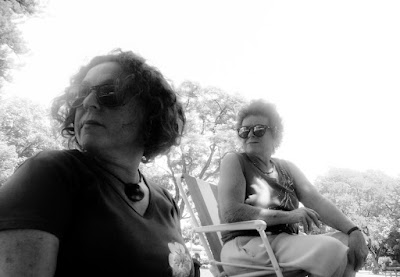In Bed with Patrick White
A back injury sees me lying in bed this weekend with Patrick White's 'The Vivisector'. 2012 is the centenary of White's birth and even though he died in 1990, he has a new novel coming out later this month published by Random House. 'The Hanging Garden' was unfinished but is, according to Geordie Williamson, in The Weekend Australian's Review 'not incomplete'. David Marr claims the manuscript is one in a series of three novellas; therefore it's internal narrative stands on its own 'and unfolds in prose that is polished to the deep lustre we expect from White.'
I love Patrick White's work, though I confess to not having read the heavyweights Voss, The Tree of Man, The Solid Mandala. What I have read is his short stories; Flaws in the Glass - a self portrait; his plays (I've yet to see a production - word on the street has it that the recent Adelaide Festival show was amateurish and I refuse to go and see a depressingly mediocre production of The Ham Funeral); David Marr's biography; and now I'm re-reading The Vivisector and find it incredible that this prodigious writer is so neglected in Australia.
I'm getting an enormous amount out of re-reading The Vivisector. It should be compulsory reading for any creative artist: painter, musician, and especially writer. White was a precise writer. He could write austerely and then pitch that against the most vivid prose that you just want to gulp up, like in this scene, where an important union occurs between The Vivisector's protagonist, the artist Hurtle Duffield and Nance, his lover and a prostitute. Duffield later paints the scene:
"Down the steps the night air hit them. Nance's face immediately tightened. Under the commonplace, but pretty confetti of light, she bowed her head, noble in a sense that he looked for and needed. She didn't attempt to paint herself out. He suspected this would be their wedding night.
Her whole room confirmed it. Though arranged no differently, the furniture, with drawers open as usual, looked of a colour and size in keeping with a ceremony. Inside the cocoon of her yellow room, of her splendid golden body, the occasion remained proportionate, and after she had put out the light, the night continued showering pink-and-green confetti through the black window."
Geordie Williamson says: 'There is something freakish about his ability to trap the entire fate of an individual in a clutch of stray thoughts and character traits.' Here, for example, is Nance speaking toward the end of her relationship with Duffield:
"She was speaking with her eyes shut, and the hairs at the nape of her neck glistened with the strain of narration and hanging on to the iron of the bed.
'... the air so soft it used to get inside of yer clothes and make yer feel downright naked. I never felt such water as the sea milky pearly round yer ankles. Dadda would catch fish. We used to live off fish - and scones. And sweet pertaters. I was skinny then. I was frightened of most things. A crab comin' at me sideways with its claws raised. Blood. I got me first blood at Brinkwater. It scared me out of me knickers, and Mother too ladylike to tell. The I got used to being scared or you couldn't keep it up or it felt too good lyun in the sun on the sand where it began to get firm watchun yer bubs grow you could sometimes you could see they'd grown since the night before...' "
Her monologue goes on - hectic, tragic, confessional; it's almost too much but it's the kind of writing that makes you feel like you're running down a ravine; you can't stop reading. White could show characters at their most bitter and desperate but there's also a lot of humour. And drinking, pissing, shitting, eating - all those very human (animal) qualities none of us can escape, no matter how above it all we think we are. There's something very levelling in Patrick White's writing. I've also flagged the dinner party scene at Boo Davenport's as one to go back to and learn from if I ever want to write a cracking good dinner party scene with a number of characters - he balances the pace and tension so well.
In The Vivisector White tackles creativity and what it is to be an artist. Like it says on the back cover, 'Patrick White illuminates creative experience with unique truthfulness.' He also covers ground that he constantly revisited and is covered in The Hanging Garden. Williamson again: 'White's incessant questions - Is there anything beyond the physical world? May there be loving human unions beyond the carnal?' These questions get to the guts of what it is to live; what it is to be human - thinking, loving, hating, creating.
The AWW has set the challenge this year for readers to read Australian women authors. I applaude this move and whole-heartedly support it ( though I don't need to join a list in order to embrace it); might we, Australian readers at least, pose the same challenge for Patrick White's work in this, the centenary year of his birth?
I'll put my money where my mouth is - I will read the tomes that I've thought I was too immature to get my head (& heart & spirit) around - the aforementioned Voss et al and the new work, The Hanging Garden. And I'll let you know how I go with that. But for now, I'll plump up the pillows and finish off The Vivisector. Thank God for bad backs.
Caroline


Comments